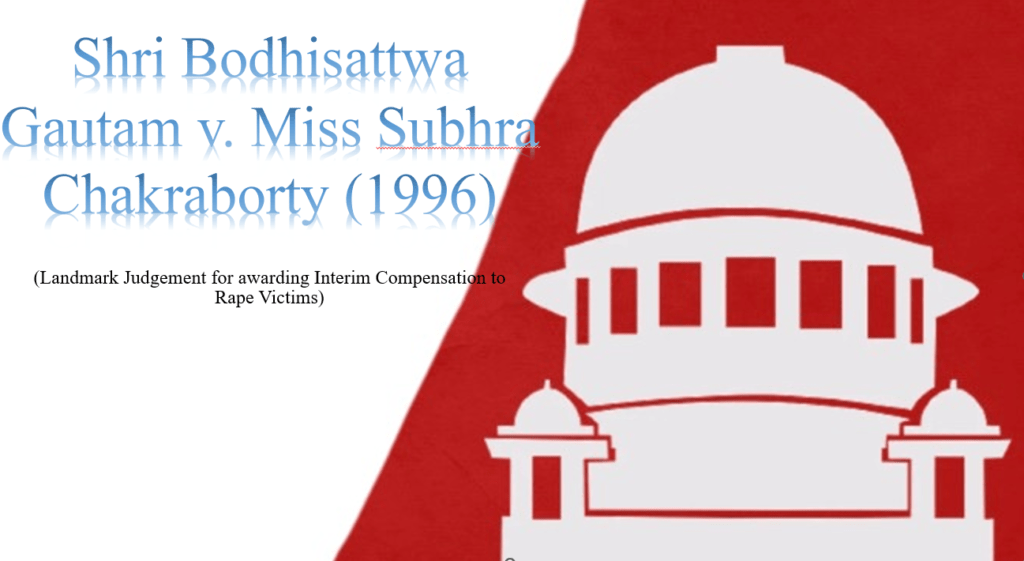(Landmark Judgement for awarding Interim Compensation to Rape Victims)

Citation: AIR (1996) SCC (1) 490
Petitioner: Shri Bodhisattwa Gautam
Respondent: Miss Subhra Chakraborty
Bench: J. Kuldip Singh, J. Saghir Ahmad
Introduction:
The instant case is an important remark for establishing the offence of rape as against the Right of Life provided under Art. 21 of the Indian Constitution. The court in this case made a significant observation in granting compensation to rape victims and regarded it as an implicit and unavoidable aspect of Right to Life. Sec. 357 and 357A of Crpc, 1973 in some way speaks of compensation which victims of any crime are entitled to receive along with several other compensation schemes by States and Centre. The case aimed to lay an emphasis on the jurisdiction of the courts to ensure that interim compensation is being given to victims of rape which should be included in such schemes. The reasoning involved in doing so was that if the court has the jurisdiction to grant compensation after the offender is convicted, the grant in respect of interim compensation would also fall within the ambit of its overall jurisdiction.
Facts of the case:
- The Respondent, Miss Subhra Chakraborty who was a student at Baptist College, Kohima filed a complaint in the Court of Judicial Magistrate, 1st Class against the Petitioner, Bodhisattwa who was a lecturer. The provisions under which she approached the court was under Sec. 312, 420, 493, 496 & 498A of I.P.C, 1860.
- Accusation against Petitioner was that he claimed to be in love with Respondent and gave false assurances of marriage with the dishonest intention of procuring sexual intercourse with her. Regardless of he deferring the marriage ceremonies, Petitioner induced the Respondent to cohabit with him and in meanwhile got the Respondent impregnated twice.
- Due to continuous pressure from the Respondent, he agreed for a secret marriage with her by having put Vermillion on her forehead but refrained from disclosing this to anyone. He used it as a way to convince the Respondent to undergo abortion as he knew that the ceremony performed did not constitute as a valid marriage. He made her undergo abortion against her free will.
- As soon as the Petitioner got a new job as a lecturer in Silchar, he left the Respondent alone and abstained considering her as his lawfully wedded wife. This resulted in serious injury and danger to Respondent’s mental and physical health The which made her go for the criminal complaint. Respondent appeared before the court and filed an affidavit as a reply where he denied the allegation made against him contending that this is a way to harass and humiliate him.
Issues:
1. Whether Court can exercise jurisdiction over matters related to direction of payment of interim compensation?
2. Whether there were grounds to quash all proceedings in the criminal case filed against the accused at the Court of Judicial Magistrate?
Judgement:
The Court dismissed the SLP. The Petitioner was directed to pay as an interim compensation a sum of ₹ 1,000/- each month from the date of lis pendens of the criminal matter. It was observed by the court that the crime of rape by Gautam violated Subhra’s fundamental right to life and personal liberty which she is entitled under Article 21. Right to Life guaranteed by Article 21 of the Constitution means the right to live with human dignity and it includes all elements that make life complete and worth-living for. The Court observed that women in India are at a turbulent or rather disadvantaged position due to social barriers and restrictions. Therefore treating them with respect is of utmost importance today. The crime of rape is not just against an individual (woman herein) but it’s a violation in rem and is opposed to the basic human rights. The Supreme Court
Conclusion:
The Supreme Court affirmed with the decision given by the High Court in this matter and further passed an order under cognizance of its own motion of the matter under Article 32 of the Constitution and granted interim compensation to the victims of rape. It was held by them that rape contributes to the violation of Fundamental Right to Life and thereby, compelled the petitioner to pay an interim compensation to the respondent. The judgement focuses on the plight of rape victims in our country and throws a light on need for immediate Reforms in the current system.
written by-Gargi Nagpal, IV Semester, Alliance School of Law, Bengaluru intern under legal vidhiya





0 Comments